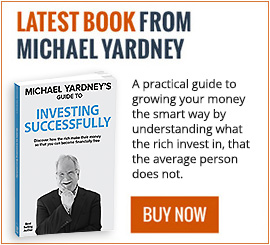Things are always easiest in hindsight, aren’t they?
It’s always easy to be able to look back and say, “Well, gee, if only I’d done it that way.”
We don’t often have that luxury.
In fact, we never have that luxury if you want to look at going forward.
If you’re really clever and you look around, there are some people who do it and they’re prepared to share that information with you.
You can learn a lot.
On a recent Real Estate Talk show I spoke to Michael Yardney who, in fact, has done just that.
Today he’ll tell us some of the things that he probably would focus on a little bit more if he had his time all over again.
HERE’S A TRANSCRIPT OF THE INTERVIEW:
(Alternatively you can listen to the short podcast at the top)
Kevin: Why did you do this exercise?
Michael: One of my children who suddenly took an interest in property said, “Dad, you’ve been investing for a long time; if you could hop back now 30, 40 years, what would you have liked to know when you started that would make things go differently?” 
Kevin: Were there many?
Michael: Sure there were a few.
The one thing I’ve realized is that I’ve stopped regretting things in the past.
There are still a lot of things I wish I would have known earlier in life.
That would have now made me a different or better investor, a more successful person, a wiser person, but you have to go through those experiences.
Today I am an accumulation of all those things – taking what I’ve done wrong and those things I’ve done well and blending them together.
Kevin: Maybe we could run through a few.
The other thing is that you actually become stronger by learning some of these lessons the hard way, don’t you?
Michael: It is much better that way. 
You actually don’t learn as much from your successes.
In fact, it may make you a little bit more arrogant.
You don’t realize what could have gone wrong and how lucky you are.
Kevin: Let’s wind the clock back. What are some of the things that you focused on?
Michael: One of the things that changed things forever for me was when I realized I was actually the pilot of my life.
I learned that my thoughts lead to my feelings, my feelings lead to my actions, and my actions lead to my results.
I learned this from a great book, The Science of Getting Rich by Wallace Wattles.
It’s actually meant that my inner world, my thoughts and my feelings, controlled my outer world, my actions and my results.
The turning point was when I realized that I was responsible for everything that happened to me, both the good and the bad.
I’m not a metaphysical person, but I realized when I was the pilot of my life rather than the passenger, I actually acted differently, behaved differently.
Even if it wasn’t true, my results are definitely better because I’m responsible for everything I do.
Kevin: How long did it take you to learn that lesson?
Michael: Unfortunately too many years.
It took me a little bit longer, because I used to blame everybody.
It was everybody else’s fault.
No it wasn’t; it was always mine.
Kevin: Yes. Just take responsibility – that’s the message here, isn’t it?
Michael: Very much so.
Kevin: What about the other one?
Michael: I also learned about this thing called the reticular activating system.
It’s the thing in the brain that allows you to see everything, forcing your surroundings to become the focus of your thoughts.
When you buy a new white car, all the sudden you see the white cars on the road everywhere.
You’re looking for a new fridge, and all the sudden, ads for the fridges are there.
What it means is what you focus on is what you get.
It taught me to set my goals and regularly review them.
That way, it keeps you focused on what’s important in your life and helps you take actions that get you closer to where you want to get to, while stopping you from getting distracted.
Kevin: Attitude ranks very highly in all this, too, doesn’t it
Michael: It’s that old “Is the glass half empty or glass half full?” story.
When things happen in life that we don’t like, we either choose to see them as a problem or as an opportunity of discovering a new solution, but it took me quite a while to discover that if you change your attitude, you actually change your reality.
Again, it’s a bit of that thing that the outside world is related to what you’re thinking about, so you have to have a positive attitude in life.
You also have to be grateful for what you have,.
Kevin: What about the idea that you give to get?
Michael: As a kid, everyone tells you that there’s much more joy in giving than receiving, but as adults, often we tend to forget that.
However, if you want to increase the value of what you receive in life – whether it’s love, relationships, money, business, opportunities – you actually have to give, because over tim e, you only get in proportion to what you give.
e, you only get in proportion to what you give.
Kevin: You mentioned earlier about attitude.
Sometimes I look at people and think they tend to wait for things to happen as opposed to making them happen.
Michael: That’s right. Look, there are three groups of people, I think: those who make things happen, as you say, there are those who watch what’s happening, and there’s another group who sit by and think, “What just happened?”
Kevin: “What the hell happened?”
Michael: I wasn’t going to say that word, you’re right.
I’d rather be in the first group.
Be on the lookout for opportunities.
Kevin: One way to make sure that you’re ahead of the game all the time, too.
What else have you learned over the years?
Michael: Have you ever heard people say how time flies?
It really does.
You have to be careful not only how and where you invest your money, but also what you invest your time in.
Many years ago, I learned this concept of the Pareto principle, where 80% of the value you receive comes from 20% of the things you do.
I think it’s important to be focused on the things that you do that take up your energy to deliver few results and just avoid them, and spend time doing productive activities.
Kevin: At the beginning of the show we talked about the lessons you can learn from other people, and sometimes, the best lessons you can learn are the ones where you stumble over and you make a mistake – as long as you learn from those.
Michael: Clearly.
As I said, you learn more from your mistakes and failures than you do from your successes, but in school, we’re taught you have to get it right; you’re not allowed to get it wrong.
I’m not suggesting go out and try to make mistakes, but one failure can, with time, create many more successes if you use it right.
Kevin: Michael, rather than agonize over some of the mistakes of the past, do you worry about the future?
Michael: I used to, but I realized that most things you worry about never happen.
They’re just monsters in your mind.
If they do happen, they never tend to end up being as bad as you expected.
Now when confronted with a challenge, I try to put things in perspective.
If something goes wrong, I used think to myself, “What’s the worst that could happen?”
Now I think, “What could be the best that could happen?”
The outcome is most likely to be somewhere in the middle of that, isn’t it?
Kevin: It is indeed.
You know another great lesson that I’ve learned?
That is not comparing yourself to others.
In other words, make your own way through life.
Michael: Very much so, whether it’s in business or whether it’s in property investments or in any sphere of your life, there will be people who may well have – on the outside – seemed to have achieved more than you, but you don’t really know what’s going on in the inside.
Forget about all the other things that people have achieved; become the best you can be.
Kevin: The one last lesson that I read from you somewhere was to understand that the economy and the investment markets move in cycles. 
Michael: A quick property lesson has been that that the economy investment markets move in cycles.
Another big lesson I would have liked to learn earlier is to start earlier in life and take advantage of the magic of compounding.
The last big one is there are always some unknown surprises coming.
Every year, there’s an X factor, some positive, some negative, so make your plans, but have some contigencies and buffers to see you through.
Kevin: Michael, thank you for sharing those great lessons with us.
Listen to the full show at RealEstateTalk.com.au and while you’re there subscribe and receive our weekly podcast (or the transcripts) where I interview Australia’s leading property experts.

No comments:
Post a Comment